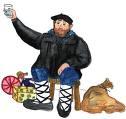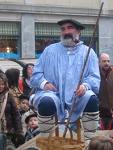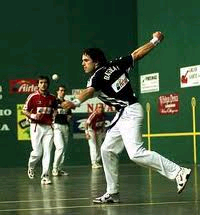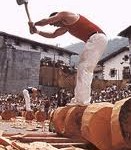Basque children can´t complain when it comes to receiving presents…they get them from two sources: one is the Olentzero (on Dec 25), and the other one are the Three Wise Men or the Three Magic Kings (on Jan 6)…dates that are very conveniently separated in time.
The first character is the coalmaker that lives up in the woods in the Basque mountains, and descends to town to give presents to the children on Christmas Eve. He smokes in a pipe, is normally dressed in traditional costumes and wears a Basque beret. He even has a girlfriend, Maridomingi, that wears the weirdest hat…Originally he was not very smart, a big eater and drinker and his intentions towards children were not the best (I´m not talking about paedofilia here, it´s more crime and assassination….). And he smokes in pipe!!!!
 Olentzero´s house can be visited and all kids are most welcome. It´s located in a very old farm house in the centre of Mungia and it´s like a Basque mythological theme park (in a very local and modest way) that shows Basque children an important part of our myths and legends, www.izenaduba.com.
Olentzero´s house can be visited and all kids are most welcome. It´s located in a very old farm house in the centre of Mungia and it´s like a Basque mythological theme park (in a very local and modest way) that shows Basque children an important part of our myths and legends, www.izenaduba.com.
 Olentzero is part of the pre-Christian pagan traditions in the Basque Country, that lost its importance throughout the centuries and was rapidly substituted by the Three Magic Kings, the most popular present bearers in Spain. Nowadays both characters represent a peaceful conviviality in the innocent children´s minds, and both have their big parade in all towns prior to the magic night.
Olentzero is part of the pre-Christian pagan traditions in the Basque Country, that lost its importance throughout the centuries and was rapidly substituted by the Three Magic Kings, the most popular present bearers in Spain. Nowadays both characters represent a peaceful conviviality in the innocent children´s minds, and both have their big parade in all towns prior to the magic night.




